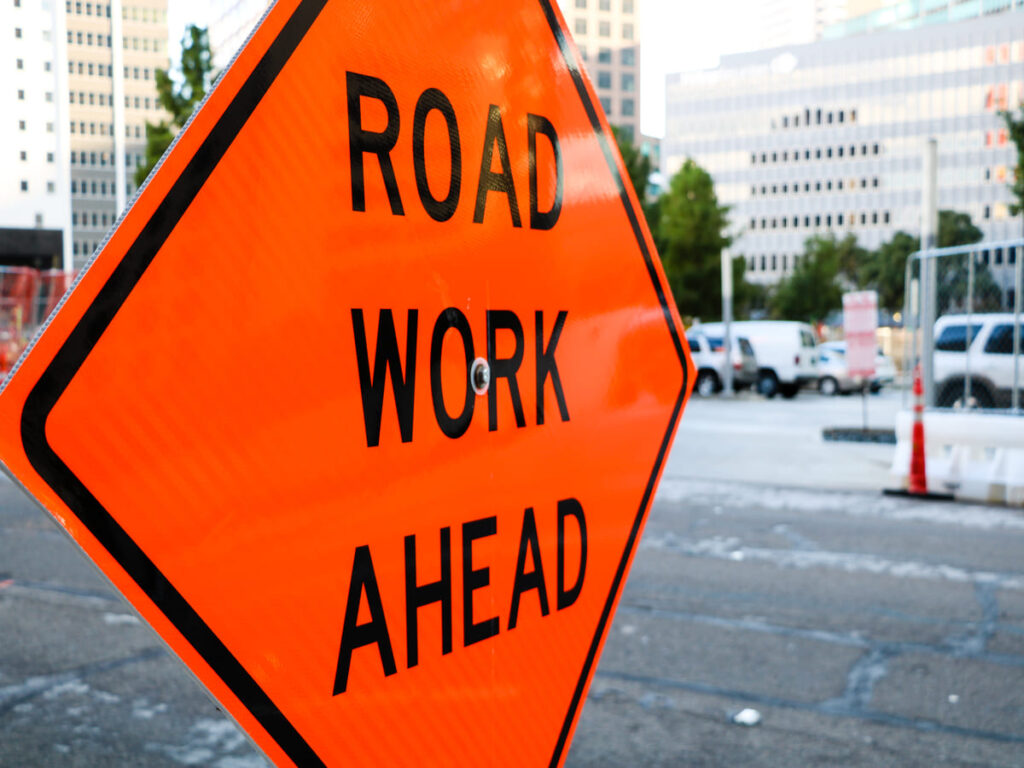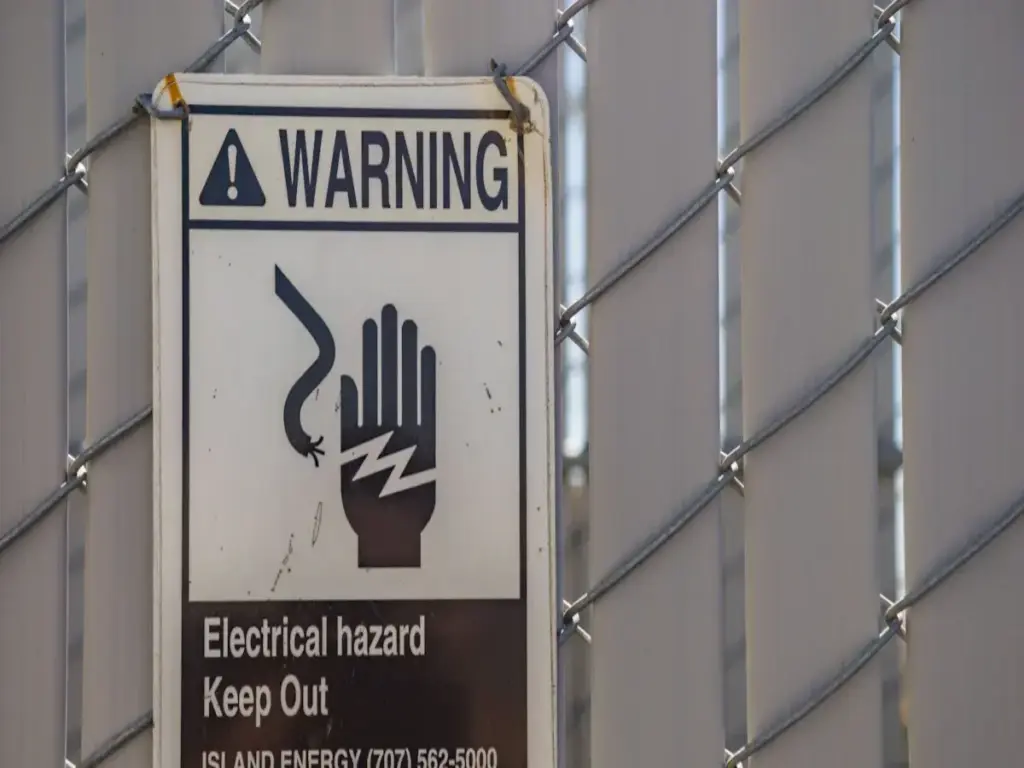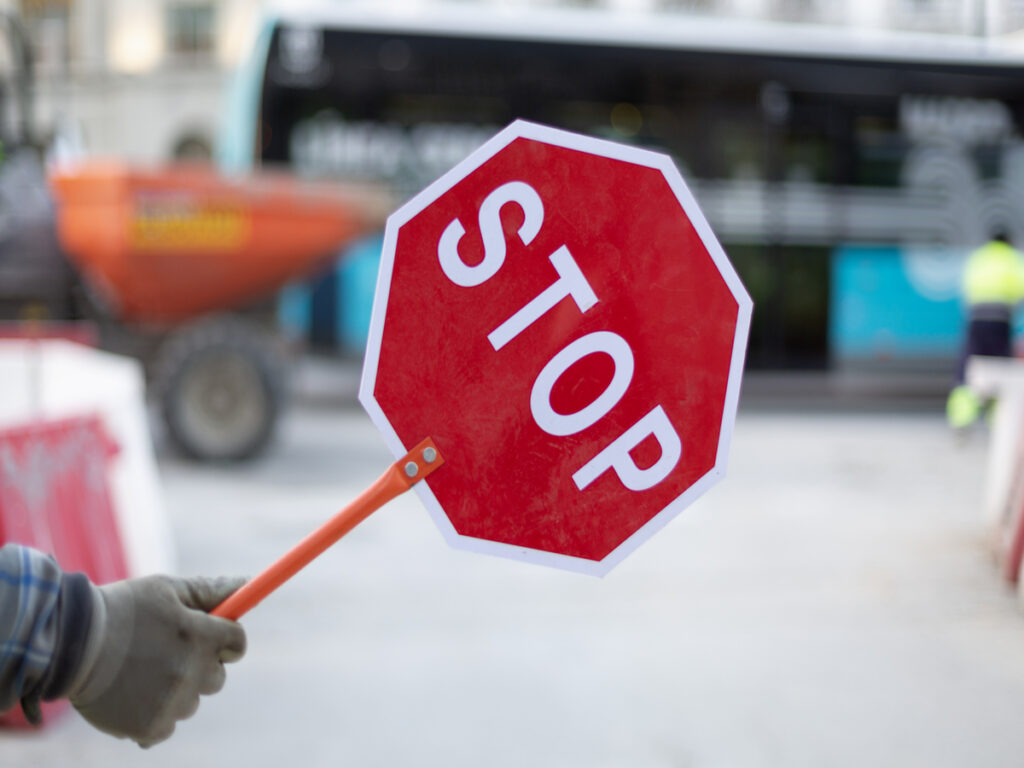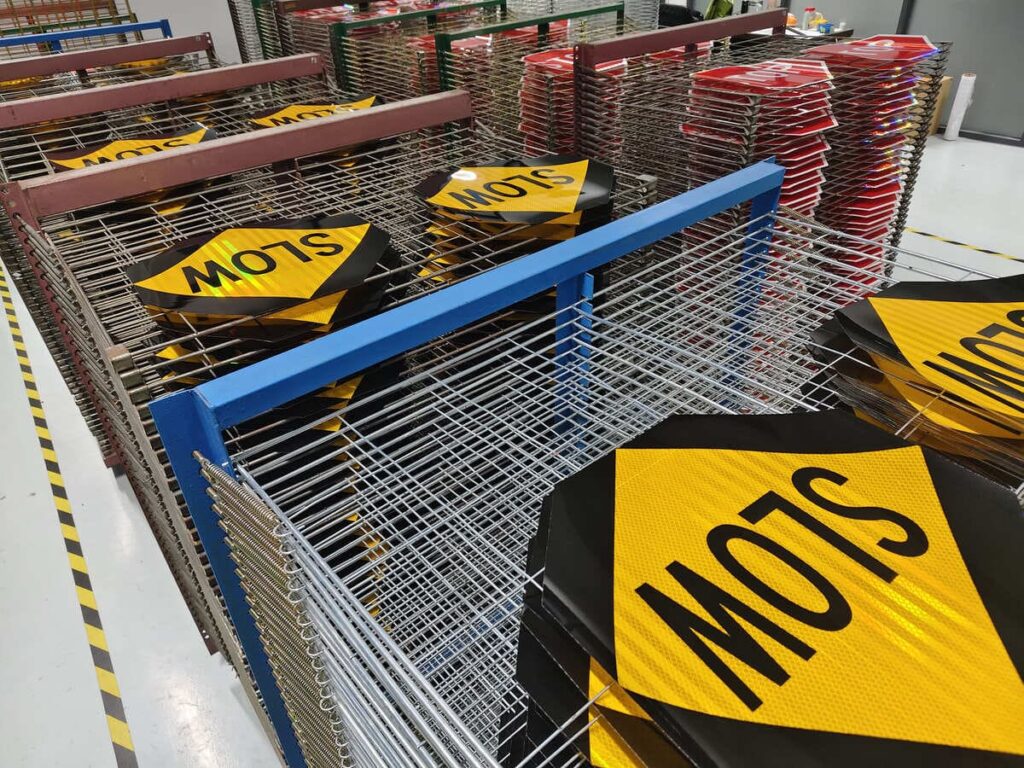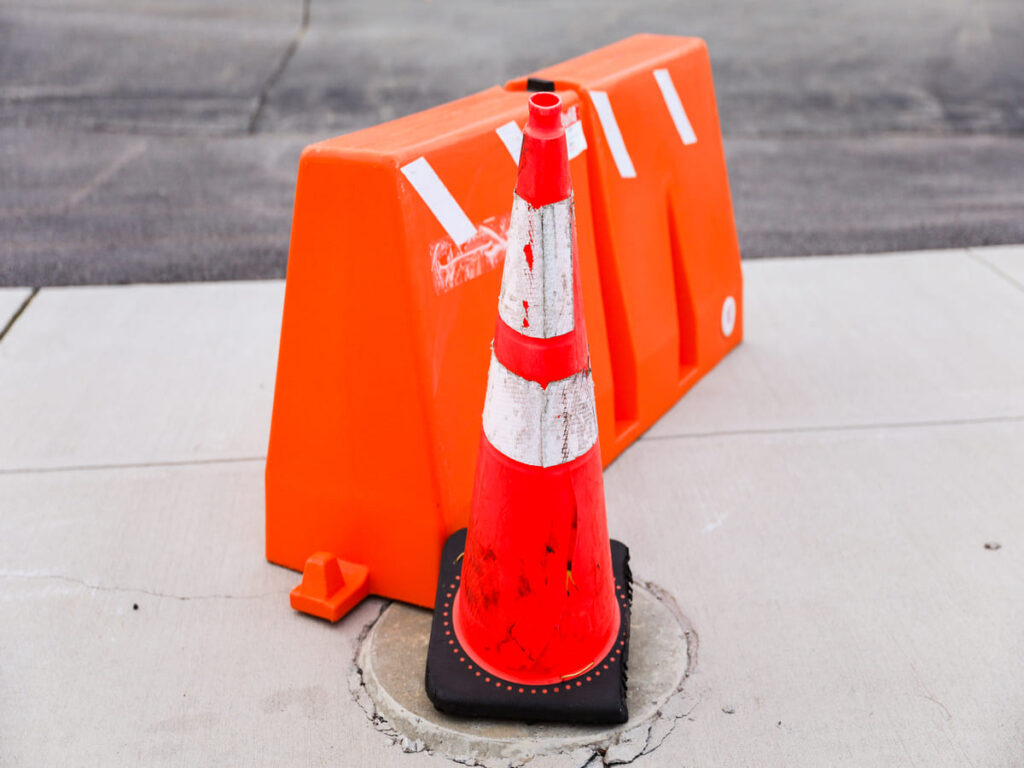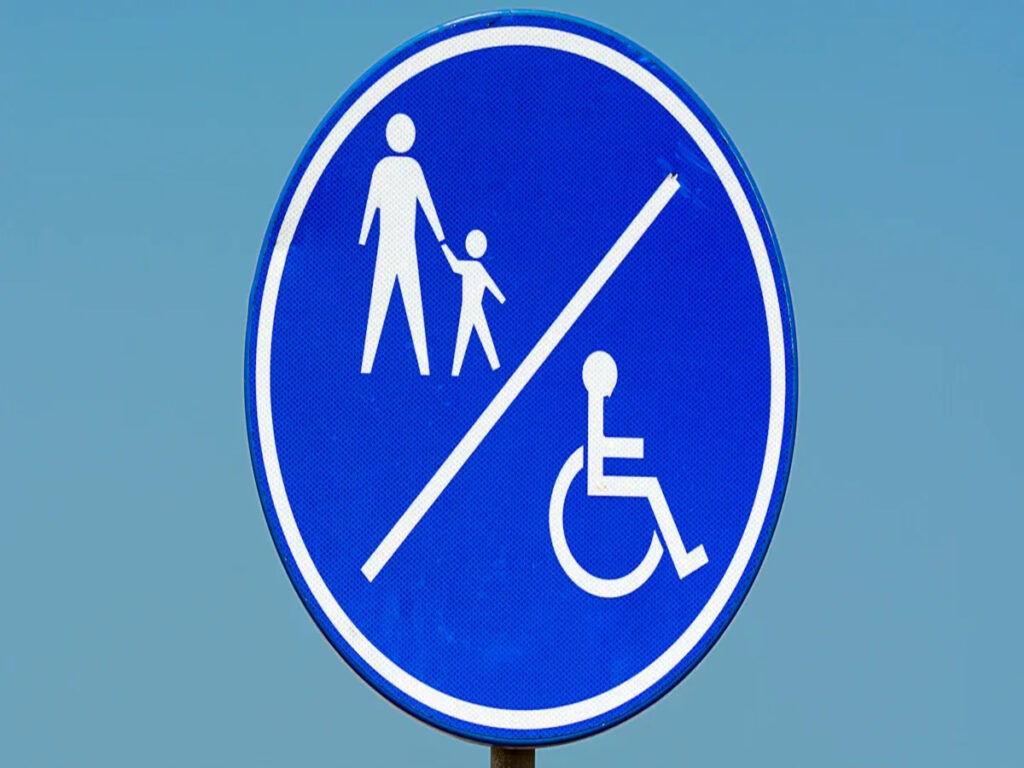
O Lei dos Americanos com Deficiência (Ada) estabelece regras para locais públicos. Sinais compatíveis com ADA ajudam pessoas com deficiência a encontrar coisas. Esses sinais os ajudam a se sentir bem-vindos e seguros. Estudos mostram sinais claros que ajudam os visitantes a ter melhores visitas.
- Sinais de orientação e Braille ajudam as pessoas a se movimentar facilmente.
- Boa sinalização torna os lugares mais seguros e acolhedores.
- O design cuidadoso ajuda a todos, não apenas pessoas com deficiência.
As pessoas percebem quando os lugares se preocupam com a acessibilidade. Essas pequenas mudanças podem ajudar uma marca a ter uma boa aparência. Eles mostram uma promessa real de incluir todos.
OPTRAFFIC oferece sinalização personalizável em conformidade com ADA que atendem a todos os requisitos regulatórios. Se você precisa Sinais de banheiro em Braille, sinais de saída táteis, ou sinalização de estacionamento acessível, OPTRÁFEGO fornece alta qualidade, soluções de sinalização duráveis adaptadas às suas necessidades. Nossa sinalização personalizada garante total conformidade com os padrões ADA, ajudando você a criar espaços acessíveis, seguro, e inclusivo para todos. Contate-nos hoje para discutir suas necessidades de sinalização ADA e iniciar seu projeto.
Uma visão geral dos sinais compatíveis com ADA
O que é o ADA e por que é importante?
A Lei dos Americanos com Deficiências é uma lei. Protege as pessoas com deficiência de tratamento injusto. Esta lei garante que todos tenham os mesmos direitos em locais públicos. Esses locais incluem lojas, restaurantes, e escolas. Os sinais compatíveis com ADA são uma grande parte disso. Esses sinais ajudam as pessoas a encontrar coisas, obter informações, e sinto que eles pertencem.
Sinais compatíveis com ADA devem estar em muitos edifícios públicos. Esses sinais têm funções importantes. Eles mostram onde estão os quartos, dar instruções, e use símbolos como o ícone da cadeira de rodas. Quando as empresas usam esses sinais, eles tornam seus espaços melhores para todos.
Se uma empresa não usar os sinais ADA corretos, pode haver problemas. Aqui está o que pode acontecer:
| Tipo de consequência | Descrição |
|---|---|
| Multas | Até $75,000 por uma primeira violação; maior para reincidência. |
| Ações judiciais | O não cumprimento pode gerar ações judiciais, aumentando os custos legais para as empresas. |
| Dano de reputação | O não cumprimento pode prejudicar a reputação de uma empresa, afetando a confiança do cliente e as vendas. |
A importância da sinalização compatível com ADA para acessibilidade
Sinais compatíveis com ADA fazem mais do que seguir a lei. Eles ajudam pessoas com diferentes deficiências a se movimentarem com segurança. Placas com letras em relevo e braille podem ser lidas pelo toque. O alto contraste de cores ajuda as pessoas que têm dificuldade em ver as cores. Quando os sinais estão sempre no mesmo lugar, é mais fácil encontrar coisas.
Aqui estão algumas maneiras pelas quais os sinais compatíveis com ADA ajudam:
- Letras em relevo e braille permitem que as pessoas leiam pelo toque.
- O forte contraste de cores ajuda pessoas com problemas de visão.
- Colocar placas no mesmo lugar ajuda as pessoas a encontrar o caminho.
- O design universal torna as coisas mais fáceis para todos.
Bons sinais de ADA mostram que uma empresa se preocupa com todos. Eles ajudam as pessoas a se sentirem menos preocupadas e mais confiantes. Esses sinais ajudam a manter todos em segurança. Seguir essas regras não envolve apenas a lei. Trata-se de garantir que todos se sintam bem-vindos.
Quais sinais precisam ser compatíveis com ADA?
Tipos de sinais que devem atender aos padrões da ADA
Ada (Lei dos Americanos com Deficiência) possui regras específicas para as quais a sinalização deve obedecer aos seus padrões. Estas regras garantem que as pessoas, especialmente aqueles com deficiência, pode navegar pelos espaços com facilidade e segurança. A maioria dos sinais que indicam quartos, fornecer instruções, ou compartilhar informações importantes devem aderir às diretrizes da ADA.
Aqui estão alguns tipos de sinais compatíveis com ADA que são essenciais para acessibilidade:
- Placas de banheiro (Por exemplo, Placas de banheiro ADA com símbolos em Braille e táteis)
- Sinais de saída e entrada, incluindo saídas de emergência (Por exemplo, Sinais de saída ADA com alto contraste e iluminação adequada)
- Sinais de escadas e rampas (Por exemplo, Sinais de escadas ADA para fácil navegação)
- Carregando sinais de doca e zona (Por exemplo, Sinais de zona de carregamento ADA com indicadores visuais e táteis claros)
- Sinais de elevador e elevador (Por exemplo, Sinais de elevador ADA para instruções de acessibilidade)
- Sinais de estacionamento e área de embarque de passageiros (Por exemplo, Sinais de estacionamento ADA com símbolos de estacionamento acessíveis)
- Sinais de alarme (Por exemplo, Sinais de alarme ADA com alertas visuais e sonoros)
- Instrumentos Especiais, Controles, e sinais de máquinas operacionais (Por exemplo, Sinalização ADA para controles de máquinas)
- Sinais de telefone (Por exemplo, Sinais telefônicos da ADA com instruções para comunicação acessível)
- Caixa eletrônico (Caixa eletrônico) Sinais (Por exemplo, Sinais de ATM ADA com Braille tátil e instruções visuais)
- Sinais de área de estar (Por exemplo, Sinais de área de estar da ADA para assentos acessíveis designados)
- Placas de vestiários e provadores (Por exemplo, Sinais de provadores da ADA para indicar áreas acessíveis)
Sinais compatíveis com ADA precisam de letras táteis, braile, e forte contraste de cores. A lei também diz onde e como colocar essas placas. Por exemplo, Os sinais devem ser 48 para 60 centímetros do chão. Eles geralmente estão no lado da trava das portas. A tabela abaixo lista alguns requisitos principais:
| Tipo de requisito | Descrição |
|---|---|
| Caracteres Braille e Táteis | Letras elevadas e nota 2 Braile, 5/8″ para 2″ alto |
| Altura e localização de montagem | 48″–60″ do chão, no lado da trava das portas |
| Alto contraste, Materiais antirreflexos | Forte contraste entre texto e fundo, acabamento fosco |
| Conformidade de fontes e caracteres | Simples, fontes sem serifa, letras pelo menos 5/8″ alto, espaçados pelo menos 1/8″ |
| Sinais direcionais e informativos | Todos devem seguir as regras da ADA |
Isenções e casos especiais em conformidade com ADA
Nem todos os sinais num edifício devem seguir as regras da ADA. Alguns sinais não precisam atender a esses padrões.
- Sinais temporários usados por sete dias ou menos não precisam ser compatíveis com ADA.
- Construir diretórios e menus que mudam frequentemente não precisa de recursos táteis ou braille.
- Placas apenas com logotipos de empresas, nomes, ou endereços não precisam seguir os padrões da ADA.
- Os números dos assentos e das fileiras nas áreas de reunião geralmente são isentos.
- A sinalização em áreas de detenção não públicas não precisa seguir as regras da ADA.
- Prédios históricos podem receber isenções para manter sua aparência original.
Dica: Verifique se uma placa é permanente ou ajuda as pessoas a encontrar o caminho. Se isso acontecer, provavelmente precisa seguir as diretrizes da ADA.
A ADA garante que sinais importantes sejam fáceis de usar por todos. Mas também dá alguma flexibilidade para casos especiais.
Principais requisitos de sinalização da ADA
Especificações de texto e fonte para sinais ADA
Sinais compatíveis com ADA usam fontes fáceis de ler. As regras dizem para usar fontes sem serifa como Helvetica ou Arial. Fontes sofisticadas ou de script não são boas para pessoas com visão subnormal. Todas as letras em relevo devem ser maiúsculas. Para sinais que você só olha, caso misto está bem se ainda estiver claro. O tamanho de fonte correto ajuda todos a ler a placa.
| Especificação | Exigência |
|---|---|
| Fonte | Sans-serif ou serifa simples (sem estilos extravagantes) |
| Maiúsculas | Todas as letras em relevo devem ser maiúsculas |
| Tamanho do personagem | 5/8”mínimo para sinais próximos; 2”para sinais mais altos; 3”+ para despesas gerais |
| Espaçamento | 1/8”–4x largura do traço; 3/8”das bordas |
| Espaçamento entre linhas | 135%–170% entre linhas |
Um tamanho de fonte de pelo menos 12 pt é melhor para a maioria das pessoas. Fontes pequenas abaixo 9 PT são difíceis de ler. Fontes muito grandes também podem dificultar a leitura.
Recursos Braille e Táteis para Acessibilidade para Deficientes Visuais
Braille e letras em relevo ajudam pessoas que não enxergam bem. As regras da ADA dizem para usar Grade 2 braille com formato arredondado. O braille fica abaixo das letras e deve ter pelo menos 3/8 a poucos centímetros de outras coisas. As letras em relevo devem ser maiúsculas e usar uma fonte sem serifa. A parte inferior da letra mais baixa deve ficar entre 48 e 60 centímetros do chão.
| Tipo de requisito | Especificação |
|---|---|
| Espaçamento | Pontos Braille a pelo menos 3/8” de outras coisas |
| Posicionamento | Braille abaixo das letras em relevo |
| Altura | 48–60” do chão para letras em relevo |
Braille e recursos em relevo ajudam as pessoas a encontrar seu caminho e a se sentirem incluídas.
Garantindo contraste e acabamento adequados em placas ADA
O contraste ajuda as pessoas a ler os sinais. ADA diz que deve haver um 65% contraste entre o texto e o fundo. Os sinais devem ter texto escuro sobre fundo claro ou texto claro sobre fundo escuro. Um acabamento fosco evita o brilho e facilita a leitura dos sinais.
| Tipo de requisito | Detalhes |
|---|---|
| Taxa de contraste | 65% mínimo entre texto e fundo |
| Terminar | Superfície fosca, sem brilho |
O contraste ruim faz com que os sinais pareçam bonitos, mas difíceis de ler, especialmente para pessoas com baixa visão.
Pictogramas e símbolos na sinalização ADA
Pictogramas são imagens simples que mostram significado sem palavras. ADA diz que os pictogramas devem ter pelo menos 6 polegadas de altura. Os rótulos de texto ficam logo abaixo do pictograma. Símbolos como o Símbolo Internacional de Acesso ajudam todos a compreender o sinal, mesmo que falem uma língua diferente.
Usar os mesmos símbolos facilita a identificação dos sinais e ajuda as pessoas a encontrar as coisas rapidamente.
Diretrizes corretas de posicionamento e montagem para sinais ADA
ADA tem regras sobre onde colocar placas. Coloque letras em relevo entre 48 e 60 centímetros acima do chão. Coloque a placa no lado da trava da porta. Se não houver espaço, use a parede mais próxima. Deixe um espaço livre de pelo menos 18 por 18 polegadas para que todos, incluindo usuários de cadeiras de rodas, pode chegar perto o suficiente para ler a placa. Um bom posicionamento ajuda as pessoas com movimentos limitados a evitar confusão e a permanecerem seguras.
Erros comuns a serem evitados com placas compatíveis com ADA
Erros com sinalização compatível com ADA podem dificultar o uso dos locais. Alguns grupos esquecem passos importantes ao fazer ou colocar cartazes. Aqui estão alguns erros comuns e como eles prejudicam a acessibilidade.
Falha ao incluir Braille
Muitas empresas se esquecem de adicionar sinais em Braille. Isso pode causar problemas legais, multas, e ações judiciais. Sem esses sinais, pessoas que não conseguem ver bem podem estar inseguras. As empresas podem perder dinheiro e receber má publicidade.
Se as placas não tiverem braille ou letras em relevo, pessoas cegas não conseguem encontrar quartos ou saídas. Isso pode deixar as pessoas confusas ou inseguras durante emergências.
Escolhendo a fonte errada para facilitar a leitura
Algumas fontes parecem legais, mas são difíceis de ler. As regras da ADA dizem para usar fontes simples sem serifa. A tabela abaixo mostra erros comuns de fonte:
| Fonte | Questão de conformidade |
|---|---|
| Times New Roman | Traços extravagantes tornam as letras confusas e difíceis de ver. |
| Quadrinhos sem | Formas estranhas e espaços irregulares tornam os sinais menos claros. |
| Script e decorativo | Letras conectadas e estilos ocupados dificultam a leitura e o toque. |
| Condensado ou estilizado | Letras esmagadas confundem as pessoas que precisam ver claramente. |
Usar a fonte errada torna os sinais difíceis de ler para todos.
Contraste insuficiente no texto e no fundo
Alguns sinais são difíceis de ver porque o texto se mistura. Um bom contraste ajuda pessoas com problemas de visão. Os problemas incluem:
- Ícones e imagens que se parecem com o plano de fundo.
- Texto que não atende 3:1 regra de brilho.
- Cores que tornam as palavras difíceis de ver.
O forte contraste ajuda as pessoas a identificar e ler os sinais.
Colocação e montagem incorreta da sinalização
Colocar placas no lugar errado pode confundir as pessoas. Erros comuns são:
- Os sinais estão muito altos ou muito baixos, não na faixa de 48 a 60 polegadas.
- Não há espaço suficiente ao redor das placas para usuários de cadeiras de rodas.
- Os sinais nem sempre estão no mesmo lugar, tornando difícil encontrar coisas.
Uma boa colocação ajuda a todos, especialmente em lugares movimentados.
Erros no uso e posicionamento de símbolos
Os símbolos e imagens devem ser fáceis de ver e estar no lugar certo. Os erros incluem usar o acabamento errado, braile antigo, ou fontes sofisticadas que são difíceis de ler. A tabela abaixo mostra como esses erros prejudicam os sinais:
| Tipo de erro | Impacto na eficácia |
|---|---|
| Acabamento antirreflexo e contraste | Difícil de ler sob luz forte. |
| Uso incorreto de braille | Confunde pessoas que não conseguem enxergar bem; Braille antigo não ajuda. |
| Texto tátil e escolha de fonte | Fontes sofisticadas tornam os sinais difíceis de ler e menos úteis. |
| Colocação de sinais | Placas em locais diferentes confundem pessoas que precisam de ajuda para encontrar coisas. |
Dica: Manter as placas iguais e no lugar certo ajuda a todos, especialmente pessoas que usam letras ou imagens em relevo para se locomover.
Sinais compatíveis com ADA ajudam as pessoas a se sentirem seguras e bem-vindas. Esses sinais fazem mais do que apenas seguir a lei. Veja a tabela abaixo para ver por que esses sinais são importantes:
| Beneficiar | Descrição |
|---|---|
| Proteção Jurídica | Reduz a chance de ser processado ou multado. |
| Reputação da marca | Mostra que você se preocupa em incluir todos. |
| Satisfação do cliente | Torna as visitas melhores para todas as pessoas. |
| Aumento do tráfego de pedestres | Traz mais clientes. |
| Ampliar a base de clientes | Permite que pessoas com deficiência visitem sua empresa. |
Verificar os sinais muitas vezes os mantém corretos e úteis. Muitos grupos olham muito para os seus sinais e resolvem os problemas antecipadamente. Especialistas e ferramentas como serviços de conformidade ADA podem ajudá-lo. Fique atualizado com as novas regras para que todos possam usar seu espaço.
Perguntas frequentes
O que torna um sinal compatível com ADA?
Um sinal é considerado Compatível com ADA quando atende às diretrizes específicas descritas pela Lei dos Americanos com Deficiências. Esses requisitos incluem:
- Letras táteis: Texto em relevo que pode ser sentido pelo toque
- Braile: Para usuários com deficiência visual
- Forte contraste de cores: Garante legibilidade, como texto escuro em um fundo claro
- Colocação correta: Os sinais devem ser montados entre 48 para 60 centímetros acima do chão, no lado da trava das portas.
Um sinal deve ser fácil de ler, acessível, e fornecer instruções claras para garantir que todos os indivíduos, incluindo aqueles com deficiência, pode navegar pelos espaços de forma eficaz. OPTRÁFEGO oferece alta qualidade, sinais personalizáveis em conformidade com ADA que atendem a todos esses requisitos, garantindo que seus espaços sejam seguros e acessíveis para todos.
Onde os caracteres em relevo devem aparecer em uma placa de banheiro da ADA?
Letras em relevo ficam acima do braille nas placas dos banheiros. Eles precisam ser 48 para 60 centímetros do chão. Isso ajuda as pessoas a encontrar e ler a placa sem problemas.
Os sinais de estacionamento da ADA precisam de caracteres em relevo?
Os sinais de estacionamento da ADA não precisam de letras em relevo. Esses sinais usam símbolos e são fáceis de ver. Letras em relevo são para sinalização interna, como números de quartos ou banheiros.
Por que os pictogramas são importantes para os sinais ADA?
Pictogramas ajudam as pessoas a entender os sinais rapidamente. Eles são bons para pessoas que não sabem ler ou falar inglês. Os sinais da ADA usam pictogramas, letras em relevo, e braille para ajudar a todos.
Como personagens elevados ajudam pessoas com deficiência?
Letras em relevo permitem que as pessoas leiam os sinais tocando-os. Eles ajudam pessoas com perda de visão a encontrar quartos e saídas. Letras em relevo tornam os lugares mais seguros e amigáveis.
Posso colocar uma placa de deficiente na frente da minha casa?
A colocação de um sinal de handicap (ou sinal de estacionamento ADA) em frente à sua casa depende dos regulamentos locais e se a vaga de estacionamento é designada para estacionamento para deficientes. Geralmente, estes sinais destinam-se a espaços públicos ou áreas de estacionamento designadas. Se você deseja instalar uma placa de deficiência na frente de sua casa, você pode precisar da aprovação do governo local ou do escritório de zoneamento. Sempre verifique com as autoridades locais para garantir a conformidade com as regras e regulamentos municipais.
Os sinais da ADA podem ser colocados nas portas?
Sim, Sinais ADA podem e muitas vezes devem ser colocados nas portas, especialmente para áreas como banheiros, elevadores, e saídas de emergência. Para conformidade com ADA, a sinalização deve incluir letras táteis e Braile, e deve ser posicionado corretamente - geralmente entre 48 para 60 centímetros do chão. Sinais nas portas ajudam a orientar pessoas com deficiência para espaços acessíveis e devem ser colocados no lado da trava para fácil visibilidade e alcance.

